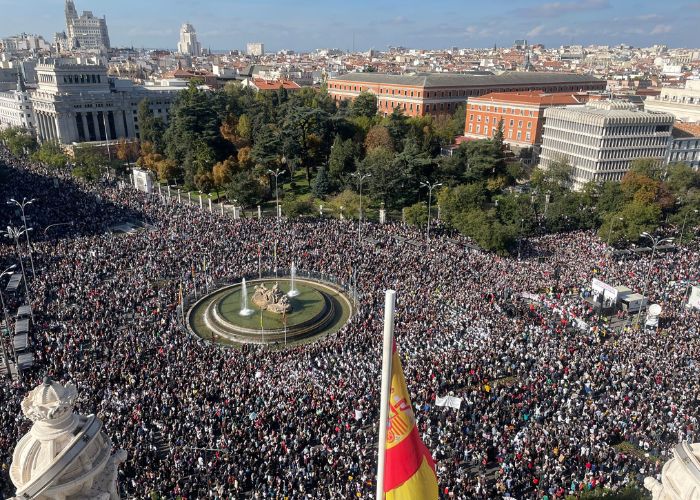MADRID – Tens of thousands of people took part in a demonstration in Madrid on Sunday against the breakdown of the health care system for which they hold regional president Isabel Díaz Ayuso responsible.
Called on by local associations and supported by the opposition parties of Isabel Díaz Ayuso’s government, tens of thousands of people flocked to Plaza de Cibeles from four different points in the city. It is the first major demonstration against Díaz Ayuso as president of the Madrid region. Few problems in Spain bring so many people together in a communal protest. The decline of healthcare is one of the exceptions.
White tidal wave
In Spain, one speaks of a ‘white tidal wave’. People are protesting the far-reaching privatisation of health care implemented by the Ayuso government. They fear that its “public, universal character” will disappear. There is also great outrage at the plan presented by the Community of Madrid for the reorganisation of emergency centres outside the hospital. The government is maintaining despite the indefinite strike by the doctors affected by the plan.
Same protest ten years ago
Government sources say 200,000 attended. The organisation estimates the number of participants at least 670,000 people. Protesters raised their hands in the air and waved white handkerchiefs during the march. It is reminiscent of the white tidal wave (la marea blanca) that washed over Madrid ten years ago. This was in protest against the privatisation of care by the then government under Ignacio Gonzalez. The current government has not responded until several hours after the demonstration, according to the newspaper El País.
Madrid demonstration also about education
Not all participants in the demonstration are healthcare professionals. People who are angry about the cutbacks in education, another topic that is high on the agenda for many, are also participating. “We are the wealthiest community in the country with the lowest investment in health and education.”
A key driver of Sunday’s protest is the plan to reopen emergency services outside the hospital. It was the only service of its kind in all of Spain to remain closed until two years after the pandemic. Emergency services ran without doctors and dozens of doctors decided to resign or even quit their jobs because they no longer wanted to work this way. And this in a context of serious staff shortages. Added to this are the wear and tear that the covid health crisis has caused in healthcare and long waiting lists.
Slogans were heard such as “public health” and “Ayuso must resign”, “Patients are not customers”, “Madrid rise, health lasts”, among others. “We are not being manipulated, this is not a boycott as the president insinuates. This is a very high ‘enough’ for a government that is killing public health in Madrid,” said Mercedes, 72, an “uncompromising” public health advocate “for everyone and everything”.
From services without doctors to video consultations
The new plan for emergency services was announced by the regional government. They had to open immediately and a week later the healthcare professionals received e-mails with their new hours, and their new nighttime work location – sometimes at a great distance from their current work location. Then Ayuso changed the plan three times in three weeks. The last change was to run the points only with nurses. The doctors on duty would only conduct video consultations.
Faltering telephone network and public transport
In addition to the telephone network in Madrid faltering for a few hours, there were other signs that the protest would be massively attended this Sunday. An hour before the start of the demonstration, the buses and metro network in the capital had practically collapsed. From the escalators of the metro stations people were already shouting: “public health!” and “If you’re going to vote, you need to be noticed!” and “Fewer flags, more nurses!”
The main trade unions and all opposition parties attended the demonstration. Más Madrid’s regional leaders, Mónica García; those of the PSOE, Juan Lobato, and that of Podemos, Alejandra Jacinto, were present. There were also ministers such as Ione Belarra, Yolanda Díaz and Irene Montero. In addition, representatives of the world of art and culture such as Pedro Almodóvar, Ana Belén, Ismael Serrano or Daniel Guzmán have been seen.
“They just continue to privatise”
Also in the crowd were people who attended the previous ‘white tidal wave’. Recognisable by the same shirt they wore ten years ago. “Ten years ago we thought we had achieved a lot, but that turns out not to be the case. They just continue to privatise,” explains a doctor from the Gregorio Marañon Illout of the house. A retired nursing assistant says in El País: “Before I experienced it from the inside through my work and now, as a user, I feel outraged. They take everything from us.”


